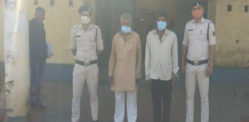"I would obsess over why we lived in such an unfair society"
Social reformer Bindeshwar Pathak passed away at the age of 80 due to a heart attack.
Known as India’s ‘Toilet Man’, he revolutionised sanitation across the country.
Born in an upper-caste Brahmin family, Mr Pathak recalled that a woman used to bring deliveries to their home and after every visit, his grandmother would sprinkle water in the area to “purify” the house.
Mr Pathak said: “I used to wonder why. People used to tell me that she was an untouchable and the land she walked on became polluted.”
Out of curiosity, he would touch her to see if it would lead to any “change in him”.
One day, his grandmother caught him and there was “an uproar”.
Mr Pathak continued: “A priest was called in and told the family that Pathak had been contaminated and must be banished from home.
“That’s when my mum intervened – he’s just a boy, she said, there must be another solution.”
There was another so-called remedy but it was “equally terrible”.
Mr Pathak said he was then forced to swallow cow dung and urine.
Mr Pathak later realised the extent of the stigma around untouchability.
He said: “I would obsess over why we lived in such an unfair society with different rules for different people.
“You can touch a dog, but touching another human who’s just like you causes a family crisis.”
He studied sociology in college and in 1968, Mr Pathak spent three months in a Dalit colony, which upset his family.
Mr Pathak discovered his calling after seeing the work of manual scavengers, whose job it was to remove human waste from “dry” toilets which had no water or flush.
In 1969, Bindeshwar Pathak designed a twin-pit toilet, freeing thousands of manual scavengers.
The Bihar government commissioned him to build 200 of these. His idea became popular and lots of important people started to seek his advice.
This attention improved his family’s opinion of his work.
Mr Pathak said: “My wife had always supported me, but it was only now that my father-in-law started to think that I must be doing something right.”
In 1970, he founded Sulabh International and over the years, he helped set up pay-per-use toilets that were clean and safe.
The concept quickly caught on and Sulabh went on to build nearly 1.3 million household toilets and more than 10,000 public toilets.
His design is also used in many other parts of the world.
Mr Pathak transformed the lives of millions of Indians, especially women, who previously had no access to toilets in crowded public places and had to exercise bladder control for hours.
During his lifetime, Bindeshwar Pathak won many prestigious Indian and global awards.
As his popularity grew, Mr Pathak was dubbed ‘Mr Sanitation’ and ‘The Toilet Man of India’.
In 1989, he reportedly led 100 girls from families of manual scavengers in Rajasthan into a temple – where Dalits were traditionally barred from entering – and ate a meal in public with them.
In recent years, the Sulabh Foundation also tied up with the Indian government’s flagship Swachh Bharat Abhiyan (Clean India Campaign) which aims to end open defecation.
Mr Pathak often said his “priority in life was to solve the problem of sanitation for people” and that “I love this work more than my sons and daughters”.
His life also provided the inspiration for the 2017 Akshay Kumar film Toilet: Ek Prem Katha.
Paying tribute to Bindeshwar Pathak, Narendra Modi said his death was “a profound loss”.
He wrote: “He was a visionary who worked extensively for societal progress and empowering the downtrodden.”
Mr Modi added that Mr Pathak had “made it his mission to build a cleaner India”.






























































